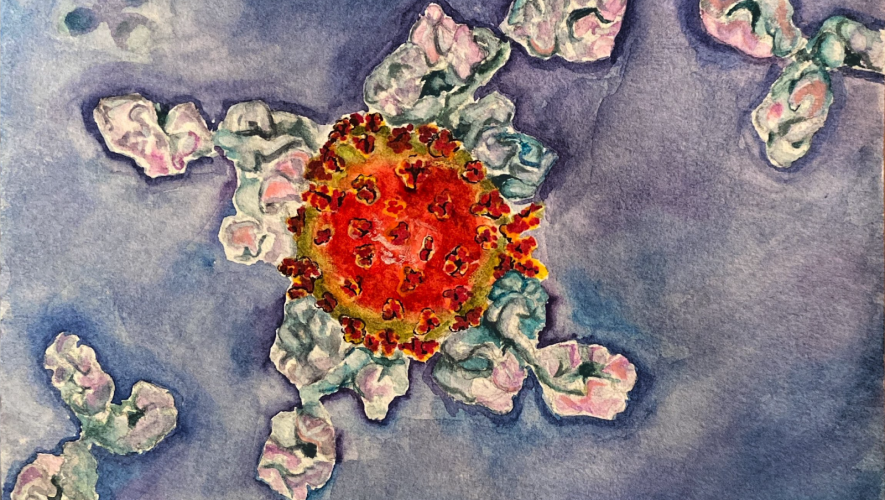Illustration by Ishita Khanna
Dear Skeptic,
I’m writing to you because I understand why you—and so many others—are doubting the COVID-19 vaccine. I’m writing because I think that I can convince you to take it anyway. And most importantly, I’m writing because I think that scientists must address your worries rather than brushing them off as anti-vax nonsense.
If the vaccine immunizes people in danger, why do I need to take it?
The most promising vaccines are reportedly 95 percent effective at conferring immunity to COVID-19. Because the vaccine is so likely to ensure individual immunity, you think forgoing vaccination won’t endanger others.
Vaccines usually don’t provide immunity in 30 to 40 percent of cases. Traditionally, it’s this limited effectiveness that justifies widespread immunization. To protect those that get an ineffective vaccine, scientists vaccinate as many people as possible to generate herd immunity—the concept that, once enough of the population is immune to a disease, transmission becomes so unlikely that the disease dies out.
Since the COVID-19 vaccine probably guarantees individual immunity, it seems to follow that there is no need for herd immunity; you can forgo the vaccine without endangering those who’ve had it.
We Still Need Herd Immunity
Millions of Americans are immunosuppressed—taking immunosuppressive drugs—or immunocompromised. For many of them, the COVID-19 vaccine won’t elicit a strong enough immune response to confer immunity. They will be susceptible to infection.
Further, if we assume that the vaccine will be 95 percent effective in the general population, this leaves five percent for whom it will not be. Since older people tend to have weaker immune systems, they will likely be overrepresented among the five percent, and are the most vulnerable to COVID-19 to start with. Forgoing widespread vaccination and herd immunity would leave the elderly disproportionately susceptible to infection, even after vaccination.
The vaccine will probably guarantee individual immunity. But because the vaccine will be less effective for specific demographics, it will leave millions of Americans unprotected. Herd immunity through widespread vaccination is the only way to keep these people safe.
Didn’t the FDA rush vaccine testing?
It’s true that under normal circumstances, the Food and Drug Administration spends years developing vaccines; ten to fifteen, to be exact. FDA procedures are strict. First, vaccines must pass safety tests in extensive animal trials. Then, phase I clinical trials recruit small groups of people to test for safety and efficacy. Next, phase II trials determine vaccine efficacy at different dosages while also monitoring for side effects. Finally, doctors administer the vaccine at its ideal dosage to thousands of people for its final safety test, phase III clinical trials.
The COVID-19 vaccine underwent these trials in less than a year. You can’t tell if it will cause long-term complications.
The FDA Thoroughly Tested the Vaccine
It is impossible to know the long-term effects because that data simply doesn’t exist. However, using this as a justification to avoid vaccination holds the COVID-19 vaccine to a higher standard than any other vaccine or medication.
While the FDA may take ten to fifteen years to approve a vaccine, clinical trials only take about seven. Within these seven years, the safety of a vaccine is investigated continuously in a controlled environment for at most four. After clinical trials, scientists release the vaccine to the public and monitor side effect reports.
Patients who believe vaccination harmed them fill out government reports that the Centers for Disease Control and Prevention (CDC) analyzes for trends while controlling for other relevant variables. The CDC then generates a list of possible side effects that inform future vaccinations.
This approval procedure shouldn’t be too surprising. Medical professionals can’t perform decades-long studies tracking millions of people for every vaccine candidate before making them publicly available. The cost of waiting for these studies to finish would far outweigh the potential cost of vaccination.
Take smallpox, for example. If scientists had waited several decades to test every potential long-term side effect of a smallpox vaccine before making it available, tens of millions of people would have died. While smallpox is more deadly than COVID-19, the harm caused by postponing vaccine availability for a generation far outweighs any harm the vaccine might bring.
In fact, all medications are subject to the same safety standards as vaccines for this exact reason. The antibiotics you took when you had pneumonia or the aspirin you took to ease your hangover were approved identically to vaccines.
When you consume any medication, the long-term effects usually aren’t known. Medications do carry risks; we just agree as a society that those risks pale in comparison to the risk of not taking medication. It is ideologically inconsistent to take some medications with unknown long-term effects but avoid the COVID-19 vaccine for the same reason.
This inconsistency is even more apparent when we consider how vaccines function. The biology involved in immunizations makes it unlikely that long-term consequences would develop without being observed in short-term studies. CDC records show that, of all the vaccinations publicly available, only the DTaP vaccine (for diphtheria, tetanus, and pertussis) might carry long-term risks that aren’t measurable in short-term studies. But even this is disputed by some rigorous analyses. We have a lot more evidence that antibiotics and aspirin have acutely undetectable long-term effects than we do for vaccines.
Isn’t the COVID-19 vaccine new, untested technology?
Not only was the COVID-19 vaccination rushed through FDA trials, it is an entirely new type of vaccine. You are skeptical that this new science won’t have unintended consequences.
Vaccines stimulate our immune system to target and neutralize viruses by jump-starting immune cells, preparing them for diseases before you become infected. Historically, scientists have used inactivated or weakened viruses or viral proteins for this purpose. The smallpox, hepatitis A, and shingles vaccines consist of an activated, weakened version of the smallpox virus, an inactivated Hepatitis virus, and specific proteins that make up the shingles virus, respectively.
The COVID-19 vaccines don’t seem to fit into these categories. They are mRNA vaccines that work by exposing our cells to viral mRNA (messenger ribonucleic acid). They don’t contain inactivated or weakened viruses or viral proteins. They are different from every other vaccine.
mRNA Vaccines Aren’t All That Different From Normal Vaccines
All vaccines contain a threatening particle that activates our immune cells. Upon vaccination, immune cells in the blood attach to threatening particles and produce antibodies that do the same. Antibodies are made by trial and error; our cells shower threatening particles with random antibodies until one of them binds.
Immune cells can sense when they have produced the correct antibody. Antibody binding activates the cells and causes them to shift from mass-producing random antibodies to producing a specific one. Antibodies are essentially chastity belts for viruses or other threatening particles, blocking off our cells from the danger.
Vaccines differ in the type of threatening particles they transport to our cells. Inactivated or weakened virus vaccines are the threatening particles themselves. Scientists take the virus we need to be immunized against, alter its genetic code to reduce pathogenicity and virulence, and infect us with it. Conversely, viral protein vaccines have traditionally contained harmless viral proteins, not the virus itself.
mRNA vaccines are really just another type of viral protein vaccine. Scientists leverage viral vectors—harmless shells left over from the genetic engineering of viruses—to transport mRNA encoding for a threatening particle to our cells. Vectors inject the mRNA into cells that read it to produce protein, all via natural processes. These viral proteins activate our immune system, causing the production of antibodies that can neutralize any virus carrying the proteins.
Because mRNA vaccines are similar to other viral protein vaccines, they don’t pose new risks. In fact, they are among the safest vaccines ever developed.
In rare cases, weakened virus vaccines have caused disease by mutating to their activated or fully functional form. For example, an outdated oral polio vaccine has caused more polio cases than would have naturally occurred. This risk is nonexistent with viral protein vaccines. Scientists genetically engineer viral vectors to such an extent that no realistic mutation sequence would render them pathogenic.
The only real risk of an mRNA viral protein vaccine is that its elicited immune response could be dangerously strong. If the COVID-19 vaccine does this, effects would be observed within a few weeks of injection when the immune response is at full-strength.
The COVID-19 vaccine—like all other vaccines—contains strengthening elements to ensure long-term stability and effectiveness. None of these will pose any threat to health; all are found naturally in everyday consumables, have short half-lives in the blood, or are used in other vaccinations that don’t have serious side effects.
Doesn’t the vaccine cause anaphylactic shock?
You are worried that the vaccine could cause an allergic reaction or an overly strong immune response.
Since the FDA made COVID-19 vaccinations available to health-care workers, twenty-one have had severe reactions and the UK Medical and Healthcare Products Regulatory Agency is instructing people with a history of allergic reactions to avoid the vaccine. The US National Institute of Allergy and Infectious Disease is also taking action, convening meetings with representatives from Pfizer, Moderna, the FDA, and independent scientists.
Only after people began experiencing allergic reactions did the media highlight that both Pfizer and Moderna excluded participants with a history of severe allergies to COVID-19 vaccine components from their clinical trials.
The Risk of Anaphylactic Shock is Extremely Low
The COVID-19 vaccine does carry the risk of anaphylactic shock. Such reactions to vaccination usually occur only once out of every million doses given. But, as of December 29, twenty-one out of 1.9 million COVID-19 vaccine recipients have experienced shock.
Scientists are speculating that the cause is polyethylene glycol (PEG), a fatty chemical used to protect vaccine mRNA as it travels through the bloodstream. There is some evidence that a small percentage of people have developed antibodies to PEG that activate their immune response when ingested. Then again, PEGs are commonly used at much higher concentrations in toothpastes, shampoos, laxatives, and many other drugs, and there have never been similar complications.
Regardless, the occurrence of anaphylactic shock certainly merits further investigation. But the vaccine is still worth taking. An incident rate of 0.001 percent is far lower than the COVID-19 death rate for any age group; the chance of death from COVID-19 ranges between 300 percent and two million percent higher than the chance of shock, depending on the age group.
I Understand Your Concerns, But Let’s Get Vaccinated
Vaccines aren’t a risk-free miracle drug. All medications carry risks. But in almost every circumstance, we agree it is worth the risk to take the medication, just as we agree it is worth the risk to drive or to live our lives in any other way. When it comes to vaccines, some can go wrong in more ways than others. For example, weakened virus vaccines run the risk of mutating while viral protein vaccines don’t.
But two things can be true at once. Even as vaccination carries risks, these risks are not any more dangerous than those for other drugs on the market. Vaccines are tested identically to other medications, and post-clinical safety investigations have never needed to assess viral protein vaccines, the type of vaccine that scientists are using to treat COVID-19.
If anything, the risks of vaccination are lower than the risks of other medications. The nature of the immune response means that most side effects will become evident within two weeks of injection; beyond the short-term, vaccination poses essentially no danger.
The COVID-19 vaccine is surprisingly effective, meaning there is less need for herd immunity. But it doesn’t mean there is no need at all. The health of millions of the most vulnerable Americans depends on widespread immunization. It’s not fair of you to put these people’s lives at risk because you hold the vaccine to a higher standard than any other medication.
I hope that I’ve convinced you that the COVID-19 vaccine is worth the minimal risks. If not, research the biology of vaccinations yourself and try to answer these questions: What ingredients are present in a vaccine? Have any of these been shown to be dangerous? What happens when you are vaccinated? What do and don’t we know about the immune response? What historical instances have there been of vaccine complications, and were these manufacturing issues or development issues? Were complications short-term or long-term?
Consider the risks of every possible outcome. Rather than focusing on the risks of vaccination alone, focus on those that arise from not getting vaccinated. Focus on the risks not just for you, but for people who can’t take the vaccine or for whom it will not be effective. Look at things as trade-offs between risks, rather than as a zero-sum game where only one side carries risk.
Then, determine which risk is greater. Will you be harmed by the vaccine more than others will from you not taking it? How severe will the harm be? Will you face temporary headaches while others face death?
I understand and agree with many of your concerns. But in the proper context, these concerns don’t preclude you from getting vaccinated.
Sincerely,
Your Fellow Skeptic



